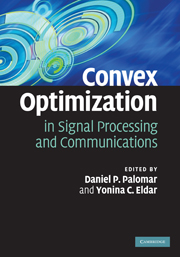Book contents
- Frontmatter
- Contents
- List of contributors
- Preface
- 1 Automatic code generation for real-time convex optimization
- 2 Gradient-based algorithms with applications to signal-recovery problems
- 3 Graphical models of autoregressive processes
- 4 SDP relaxation of homogeneous quadratic optimization: approximation bounds and applications
- 5 Probabilistic analysis of semidefinite relaxation detectors for multiple-input, multiple-output systems
- 6 Semidefinite programming, matrix decomposition, and radar code design
- 7 Convex analysis for non-negative blind source separation with application in imaging
- 8 Optimization techniques in modern sampling theory
- 9 Robust broadband adaptive beamforming using convex optimization
- 10 Cooperative distributed multi-agent optimization
- 11 Competitive optimization of cognitive radio MIMO systems via game theory
- 12 Nash equilibria: the variational approach
- Afterword
- Index
5 - Probabilistic analysis of semidefinite relaxation detectors for multiple-input, multiple-output systems
Published online by Cambridge University Press: 23 February 2011
- Frontmatter
- Contents
- List of contributors
- Preface
- 1 Automatic code generation for real-time convex optimization
- 2 Gradient-based algorithms with applications to signal-recovery problems
- 3 Graphical models of autoregressive processes
- 4 SDP relaxation of homogeneous quadratic optimization: approximation bounds and applications
- 5 Probabilistic analysis of semidefinite relaxation detectors for multiple-input, multiple-output systems
- 6 Semidefinite programming, matrix decomposition, and radar code design
- 7 Convex analysis for non-negative blind source separation with application in imaging
- 8 Optimization techniques in modern sampling theory
- 9 Robust broadband adaptive beamforming using convex optimization
- 10 Cooperative distributed multi-agent optimization
- 11 Competitive optimization of cognitive radio MIMO systems via game theory
- 12 Nash equilibria: the variational approach
- Afterword
- Index
Summary
Due to their computational efficiency and strong empirical performance, semidefinite relaxation (SDR)-based algorithms have gained much attention in multiple-input, multiple-output (MIMO) detection. However, the theoretical performance of those algorithms, especially when applied to constellations other than the binary phase-shift keying (BPSK) constellation, is still not very well-understood. In this chapter we describe a recently-developed approach for analyzing the approximation guarantees of various SDR-based algorithms in the low signal-to-noise ratio (SNR) region. Using such an approach, we show that in the case of M-ary phase-shift keying (MPSK) and quadrature amplitude modulation (QAM) constellations, various SDR-based algorithms will return solutions with near-optimal log-likelihood values with high probability. The results described in this chapter can be viewed as average-case analyses of certain SDP relaxations, where the input distribution is motivated by physical considerations. More importantly, they give some theoretical justification for using SDR-based algorithms for MIMO detection in the low SNR region.
Introduction
Semidefinite programming (SDP) has now become an important algorithm design tool for a wide variety of optimization problems. From a practical standpoint, SDP-based algorithms have proven to be effective in dealing with various fundamental engineering problems, such as control system design [1, 2], structural design [3], signal detection [4, 5], and network localization [6–8]. From a theoretical standpoint, SDP is playing an important role in advancing the theory of algorithms.
Information
- Type
- Chapter
- Information
- Convex Optimization in Signal Processing and Communications , pp. 166 - 191Publisher: Cambridge University PressPrint publication year: 2009
Accessibility standard: Unknown
Why this information is here
This section outlines the accessibility features of this content - including support for screen readers, full keyboard navigation and high-contrast display options. This may not be relevant for you.Accessibility Information
- 3
- Cited by
